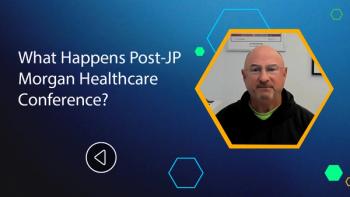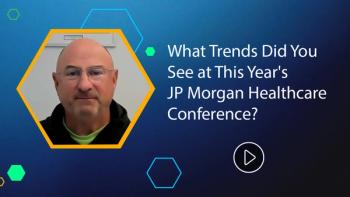
Advantages & Disadvantages of Using Compounded Medications
Scott Brunner, CEO, and Tenille Davis, Chief Advocacy Officer, of the Alliance for Pharmacy Compounding discuss how compounded medications differ from commercially available drugs in terms of their manufacturing process, quality standards, and more.
Scott Brunner, CEO, and Tenille Davis, Chief Advocacy Officer, of the Alliance for Pharmacy Compounding discuss the challenges faced by patients and healthcare providers due to drug shortages, particularly for semaglutide and other medications. It highlighted the role of compounding pharmacies in addressing these shortages and the importance of distinguishing legitimate compounding pharmacies from illicit actors. The conversation also emphasized the need for collaboration between pharmaceutical manufacturers, healthcare providers, and regulatory agencies to improve the drug supply chain and ensure patient access to essential medications.
What specific measures can be taken to prevent the proliferation of counterfeit medications and protect patients from harm? How do compounded medications differ from commercially available drugs in terms of their manufacturing process, quality standards, and regulatory oversight? Are there advantages and disadvantages of using compounded medications compared to traditional pharmaceutical products?
Scott Brunner: Counterfeit and illicit substances are a scourge in our healthcare system, and with the growth of GLP-1s, this phenomenon that we're seeing more and more counterfeit activity is taking place. We are seeing, not only sellers of substances that purport to be GLP-1 drugs. We're seeing entities that purport to be pharmacies that are not. There was a study out of, think it was out of Southern Cal University of Southern California a few months ago that had indicated that as many as 40% of online pharmacies were fake, which means not registered with not licensed by the State Board of Pharmacy or any of that. And those websites, they pop up. Somebody takes them down, and they'll pop up in another iteration, many of them are selling what purport to be prescription drugs without a prescription, and that is, it's just remarkably dangerous.
One of our concerns is the way that drug makers and others have conflated legitimate compounding with the illicit actors out there. Those aren't comparable. Those are those are two different things, and we can talk about ways that you can differentiate between what is a legitimate compounding pharmacy and an illicit actor, but we do believe more needs to be done to address that scourge. There was a letter just recently sent from the Republican leaders of the House Energy and Commerce Committee to FDA asking FDA for a thorough report on how the agency is confronting this, the counterfeit activity out there, because patients are absolutely being harmed by this.
Tenille Davis: That's absolutely correct. The FDA approved version of medication should always be the first choice for a patient. It's only when that's not appropriate for a patient so they have an allergy to an Excipient, or they need a specialized dosage form, or the FDA approvers not available that compounding is authorized in the Food, Drug and Cosmetic Act. Compounding pharmacies don't have this the same manufacturing standard as big drug companies. They can't because, for the most part, they're making things for a single patient at one time. So, it's a lot more custom than a drug maker making millions of dosage forms, potentially. But that doesn't mean that compounding pharmacies aren't regulated. They are regulated by State Boards of Pharmacy. That's the primary regulator of compounding pharmacies.
They're also regulated by the FDA and inspected by the FDA, typically in a four cause basis, so if there's a problem or a complaint, the FDA can go in and inspect a compounding pharmacy. And most all states have adopted what's called the US Pharmacopeia standards when it comes to compounding which essentially lay out what pharmacies must and should do with regards to testing and training and cleaning and all of the things that go into the compounded products that they make. A lot of the claims in the media that with compounded drugs, you just don't know what's in there are you know, kind of overblown or misunderstood, because compounding pharmacists absolutely know what's in the products that they make. You know they're required to send samples of those products out to third party laboratories for all sorts of testing for sterility and potency and container closure and antimicrobial effectiveness, and you name it. So, these claims with legitimate state licensed company pharmacies, they do know what's in there.
And the conflation and confusion between illicit online drug sellers and counterfeiters is unfortunate because it makes it really difficult for patients and prescribers to have faith in the whole system, because it's confusing for them to differentiate between these different actors. So, we like to say, if you didn't go to a doctor, either telehealth visits or an in person, and get your prescription dispensed to you and your name by a pharmacy, probably what you're getting is not what you think it is, because those things are required for a legal dispensing of a prescription. If there wasn't a legal dispensing of a prescription, you have no guarantee as to what you purchased, and it was likely, you know, to be not what you think it is.
Newsletter
Lead with insight with the Pharmaceutical Executive newsletter, featuring strategic analysis, leadership trends, and market intelligence for biopharma decision-makers.




